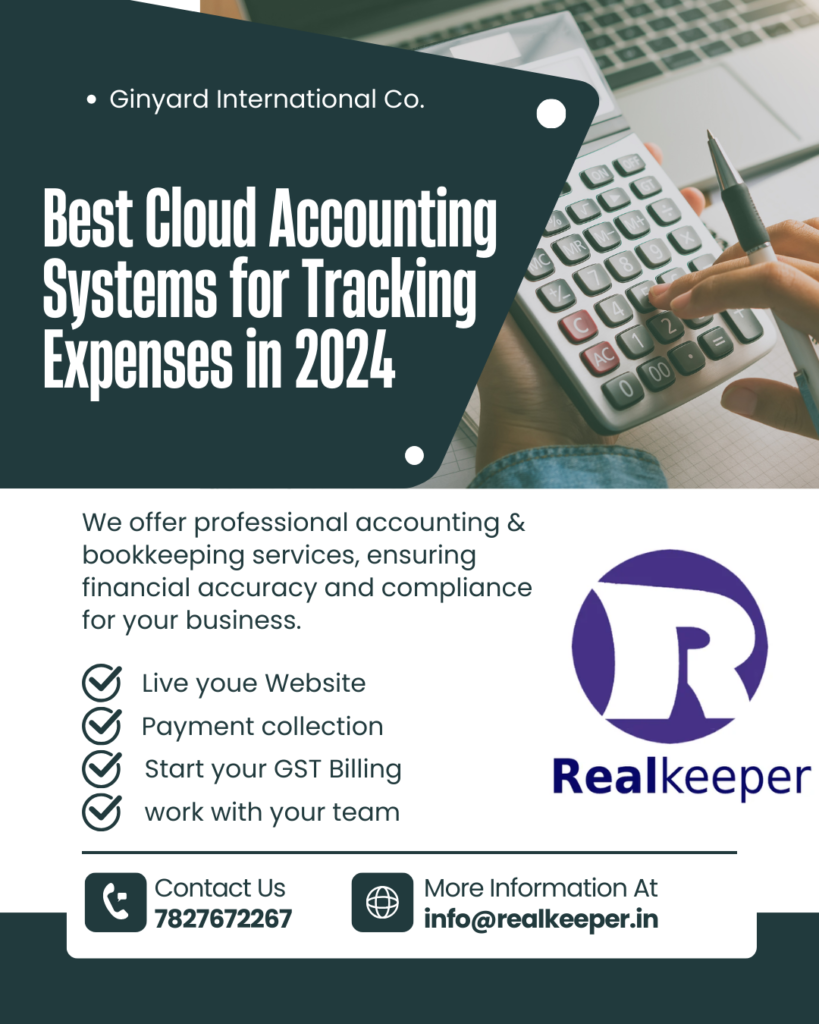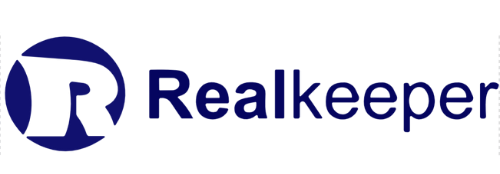In today’s competitive business landscape, efficiently tracking expenses is essential for any company, regardless of size. Managing expenses not only helps businesses control costs but also provides valuable insights into cash flow, profitability, and overall financial health. In 2024, cloud accounting systems have become the go-to solution for businesses looking to streamline their expense tracking processes. These systems offer flexibility, automation, and real-time data access, making them indispensable for businesses of all kinds.
This blog will delve into the best cloud accounting systems for tracking expenses in 2024, and highlight why Realkeeper, a robust cloud-based accounting software, is an excellent choice for small businesses, freelancers, and startups.

What is Cloud Accounting?
Before diving into the top systems, it’s important to understand what cloud accounting is. Cloud accounting software allows businesses to manage their financial data and processes via the internet, storing all the information on remote servers (the cloud) rather than on local devices. This enables real-time access from anywhere, with enhanced security and collaboration options. Users can track expenses, manage invoices, and generate financial reports without needing to be physically present at the office or on a specific device.
Why Expense Tracking Matters
For businesses, tracking expenses is more than just recording numbers. It provides critical insights into spending patterns, identifies potential areas of cost-saving, and helps ensure that budgets are being adhered to. Additionally, accurate expense tracking is necessary for tax purposes and regulatory compliance.
Here’s why cloud-based accounting systems are particularly effective for managing expenses:
- Real-Time Updates: Transactions are recorded instantly, offering an up-to-date picture of financial health.
- Automation: Many systems automate the process of logging expenses, eliminating the need for manual data entry.
- Receipt Management: Cloud accounting software often includes features for scanning and storing receipts digitally, making paper trails a thing of the past.
- Collaboration: Multiple users can access and manage expenses simultaneously, making it easier for teams to work together.
- Security: Cloud systems offer strong encryption, keeping sensitive financial data safe and secure.
The Best Cloud Accounting Systems for Tracking Expenses in 2024
1. Realkeeper – The Ideal Solution for Small Businesses
Realkeeper is an innovative cloud accounting software designed specifically for small businesses, freelancers, and startups. It provides a simple, affordable solution for managing expenses, invoicing, and other accounting tasks, all through an intuitive cloud-based platform.
Key Features of Realkeeper:
- Automated Expense Tracking: Realkeeper links directly with your bank accounts, automatically importing and categorizing your expenses. This reduces the chances of errors and saves time.
- Mobile App: Realkeeper’s mobile app enables users to track expenses on the go. Whether you’re traveling for work or making purchases, you can log and monitor expenses in real-time.
- GST Billing: For businesses in India, Realkeeper offers built-in GST billing, ensuring compliance with tax regulations and automating tax calculations on expenses.
- Multi-User Access: With Realkeeper, you can easily collaborate with team members or accountants, allowing them to access and manage financial data securely.
- Expense Reports: Generate detailed reports on your expenses, providing insights into spending patterns and helping you make informed financial decisions.
Why Choose Realkeeper? Realkeeper stands out because of its focus on small businesses, freelancers, and startups that need a powerful but easy-to-use system at an affordable price. It’s particularly popular in regions like India due to its GST compliance feature, but it’s suitable for businesses globally.
2. QuickBooks Online
QuickBooks Online is one of the most popular accounting platforms globally, trusted by businesses of all sizes. It’s widely regarded for its comprehensive features, including a powerful expense tracking module.
Key Features:
- Bank Integration: QuickBooks automatically imports transactions from your bank accounts, simplifying expense logging.
- Receipt Scanning: Using the QuickBooks mobile app, you can scan and upload receipts directly to the platform, making it easy to track expenses on the go.
- Custom Reports: Generate expense reports tailored to your business needs, helping you understand where your money is going.
- Expense Categorization: QuickBooks automatically categorizes expenses, ensuring that everything is organized and accurate for tax time.
Pros: Robust features, well-known brand, and strong integration with third-party apps.
Cons: It can be expensive for small businesses, especially those just starting.
3. Xero
Xero is another excellent cloud-based accounting software that is well-suited for small to medium-sized businesses. It’s known for its simple, user-friendly interface and strong expense management capabilities.
Key Features:
- Expense Automation: Xero links with your bank to automatically log and categorize expenses, making it easier to stay on top of financial transactions.
- Mobile App: The Xero mobile app allows users to track expenses, submit claims, and view reports from anywhere.
- Approval Workflow: Xero provides a formal approval process for expenses, making it ideal for larger teams where expense approvals are necessary.
- Detailed Expense Reports: Get a clear breakdown of where your money is going with Xero’s reporting tools.
Pros: Great for small businesses, user-friendly interface, and robust automation features.
Cons: The learning curve for advanced features can be steep.
4. FreshBooks
FreshBooks is widely known for its simplicity and ease of use, making it a top choice for freelancers, consultants, and small business owners who want a hassle-free accounting experience.
Key Features:
- Expense Logging: FreshBooks allows you to manually log expenses or link with your bank account for automatic updates.
- Receipt Upload: Snap photos of your receipts using the FreshBooks app and store them digitally.
- Customizable Reports: FreshBooks provides detailed reports, giving you insights into your expenses and helping you manage your cash flow more effectively.
- Invoicing and Expense Tracking: FreshBooks combines invoicing and expense tracking, making it easy to manage both aspects of your business finances from one place.
Pros: Very user-friendly, great for freelancers and small businesses with basic accounting needs.
Cons: Not as feature-rich as other systems, so may not be ideal for growing businesses.
5. Zoho Books
Zoho Books is part of the larger Zoho suite, which includes CRM, project management, and other business solutions. It’s perfect for businesses that are already using other Zoho products and need a reliable accounting solution to integrate with their existing tools.
Key Features:
- Expense Automation: Zoho Books links to your bank accounts and credit cards, automatically logging and categorizing transactions.
- Mobile Access: Zoho’s mobile app allows users to track and manage expenses on the go, ensuring you never miss a transaction.
- Expense Approval Process: Zoho Books offers an expense approval workflow, making it great for businesses with multiple employees who need to submit expense claims.
- Multi-Currency Expense Tracking: Zoho Books supports multiple currencies, making it a great choice for businesses that deal with international clients.
Pros: Seamless integration with the Zoho suite, multi-currency support, and affordable pricing.
Cons: May not be ideal for businesses not already using Zoho products.
Choosing the Best Cloud Accounting System for Your Business
When choosing the best cloud accounting system for tracking expenses, it’s important to consider the unique needs of your business. Whether you’re a freelancer, a small business owner, or part of a larger team, different cloud accounting systems offer different features.
Here’s a quick guide to help you decide:
- For Small Businesses and Freelancers: Realkeeper offers the perfect balance of affordability and functionality. It provides all the necessary tools for managing expenses, invoicing, and tax compliance, especially for businesses in India with its GST billing feature.
- For Medium-Sized Businesses: QuickBooks Online or Xerox may be better suited to businesses that require more advanced features or have a larger team. Both offer robust solutions for expense management and integrate well with other business tools.
- For Simplicity: If you’re a freelancer or a small business owner looking for simplicity, FreshBooks is an excellent option. Its user-friendly interface makes it easy to log expenses and generate reports without the complexity of larger systems.
- For International Businesses: If you deal with international clients or multiple currencies, Zhou Books offers multi-currency support and seamless integration with the Zhou ecosystem.
Final Thoughts
Expense tracking is a vital component of any business’s financial management strategy. In 2024, cloud accounting systems provide businesses with the tools they need to automate and streamline this process, ensuring that financial data is accurate, up-to-date, and accessible at any time.
Realkeeper stands out as a top choice for small businesses, freelancers, and startups, offering an affordable, user-friendly solution that simplifies expense tracking and overall financial management. With its cloud-based platform, automated features, and mobile app, Realkeeper is designed to help businesses take control of their finances and ensure long-term success.
If you’re looking for a reliable and easy-to-use cloud accounting system, consider Realkeeper and start managing your expenses more effectively today!



